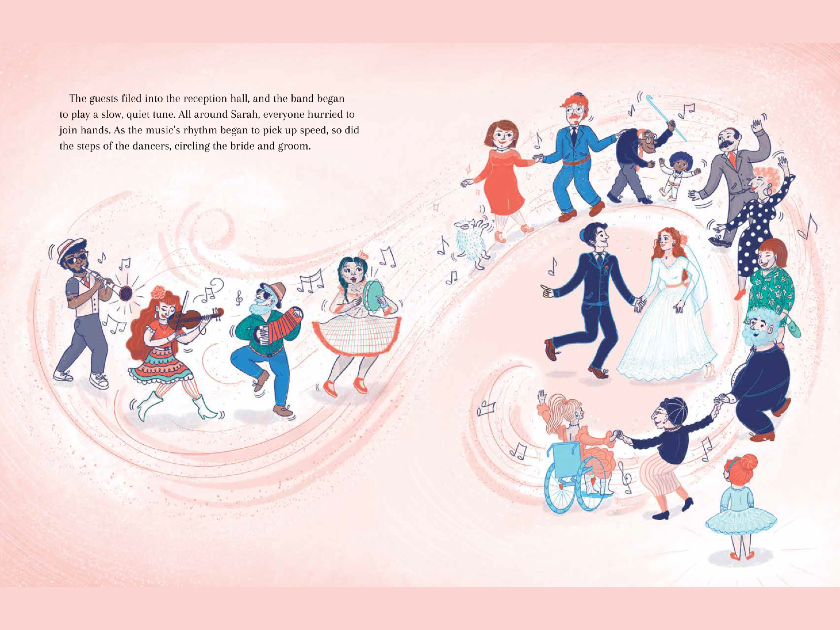
“The guests filed into the reception hall, and the band began to play a slow, quiet tune. All around Sarah, everyone hurried to join hands. As the music’s rhythm began to pick up speed, so did the steps of the dancers, circling the bride and groom.”
Excerpted from Sarah’s Solo written by Tracy Brown and illustrated by Paula Wegman
The prevalence of social media and smartphones has caused a surge of FOMO — the fear of missing out. With our entire lives on display on Instagram, Facebook, and Twitter, it’s hard not to feel some anxiety when others seem to be having more exciting experiences than we are at any given moment. This may be especially true for children choosing to engage in Jewish family rituals, rather than in secular activities with their peers. My children spent many Shabbat dinners experiencing FOMO as their friends attended their school’s Friday night football games. As they got older, however, they found a way to make these Shabbat evenings festive by inviting friends to share in these rituals, introducing them to challah and other Shabbat foods; in doing so, they eventually found the opposite of FOMO — the joy of missing out.
I thought a great deal about JOMO — the joy of missing out — when writing Sarah’s Solo. While Sarah is disappointed when her parents tell her that she must miss performing the solo at her dance recital to attend her cousin’s wedding, Sarah ultimately finds JOMO in the Jewish rituals at the wedding. My hope is that children reading Sarah’s Solo will find that there is always something to enjoy in every situation they find themselves in. Doing so is inherently Jewish. As the Mishnah teaches: “Who is rich? He who rejoices in his lot.”
As Jews, we have all heard the story of Sandy Koufax, the Los Angeles Dodgers baseball player who famously chose not to pitch in Game One of the 1965 World Series because it fell on Yom Kippur. I recall a tough discussion with my son Sammy over whether he would pitch in an important baseball game that fell on the first night of Passover. If Sandy Koufax could miss a World Series game, surely Sammy could miss a high school game. A hard choice for any teenager to be sure — take part in our family tradition, or have FOMO by missing an important game.
If Sandy Koufax could miss a World Series game, surely Sammy could miss a high school game. A hard choice for any teenager to be sure — take part in our family tradition, or have FOMO by missing an important game.
My book Sarah’s Solo touches on those times my children were forced to make the tough decision to choose Jewish rituals over other interests. They opted — with the occasional nudge from my husband and me — for family, rites of passage celebrations, and holidays, over attending secular events such as athletic competitions of all sorts, birthday parties, school dances, and so on.
In Sarah’s Solo, Sarah is devoted to ballet. She practices tirelessly for the solo she is to perform at her dance recital. When she is informed by her parents that her cousin Lizzy is getting married on the day of the recital and that she will not be able to perform her solo after all, she is understandably disappointed. When she arrives at the wedding, she is fidgety and disengaged but becomes interested in the dance-like quality of the bride circling around the groom. Later, when the band plays “Hava Nagila”and the guests dance the Hora, Sarah becomes captivated. As the bride pulls Sarah into the center of the dance circle, Sarah becomes lost in another world. Sarah performs a solo after all, just not the one she originally planned.
Sarah’s Solo will be released on March 2, 2021 as the world is entering its second year of the Covid-19 pandemic. The Covid-19 reality for many kids means missing out on a lot of activities — in-person schooling, playdates with friends, and indoor activities such as the ballet that Sarah so loves. FOMO can be even more difficult than usual for children during these complex times. I am hoping that reading Sarah’s Solo will open up some interesting discussions about FOMO, disappointment, and hopefully finding JOMO in spending time as a family.
Tracy Brown published her debut children’s Jewish picture book Sarah’s Solo in 2020.. In 2019, Tracy earned a graduate certificate from the Children’s Lit Fellows program at Stony Brook University. She graduated from Brown University with a BA in English in 1986 and from Benjamin N. Cardozo School of Law in 1991. Tracy serves as the secretary for the Executive Board of the Jewish Book Council. Tracy served on the Board of Trustees of the Jewish Federation of Greater Charlotte and was awarded the Kipnis-Wilson/Friedland Award in 2012 for her lifetime commitment to Jewish philanthropy.